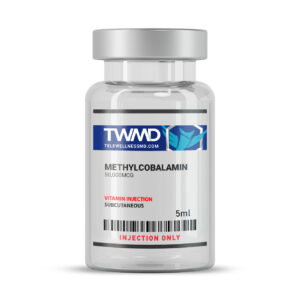Cyanocobalamin vs Methylcobalamin Vitamin B12 Injections
Vitamin B12, medically known as cobalamin, is one of the components of the vitamin B complex. Cobalamin is vital for proper functioning of the nervous system and for the creation of blood cells. Their are multipal difference between Cyanocobalamin vs Methylcobalamin. Food or Supplements are the main source of cobalamin . Secondly the improper absorption in the small intestine can lead to a cobalamin deficiency in some people.
In this case, or for those who would simply like additional cobalamin, vitamin B12 injections are available. However, there are two different types of cobalamin: cyanocobalamin and methylcobalamin. Before getting an injection, you should know the difference between these two types. In this blog we will share complete details about Cyanocobalamin vs Methylcobalamin so that you can choose a better product while during selection.
Visit Official Website: TeleWellnessmd
The Difference Between Cyanocobalamin and Methylcobalamin
Cyanocobalamin and methylcobalamin differ by a single molecule. Cyanocobalamin sports a cyanide attached to its core structure, the cobalamin compound. Methylcobalamin, on the other hand, features a methyl group in its place. While this seems like a minor difference, it can impact your health.
Due to lower production costs, cyanocobalamin dominates as the form of B12 found in most supplements. It’s an artificial creation, not found naturally. Because it contains cyanide, a harmful substance for the body, cyanocobalamin requires conversion before use. The body actively breaks down cyanocobalamin, removing the cyanide and attaching a methyl group to transform it into methylcobalamin. This conversion must occur before the body can utilize it as vitamin B12.
The human body naturally has a supply of methyl molecules. typically used for a process called methylation. Methylation is a normal function of a healthy body. It is important for stabilizing free radicals and detoxification. which keeps the body healthy and illness-free. Consumption of methylcobalamin replenishes the body’s supply of methyl molecules. whereas consumption of cyanocobalamin depletes the supply of methyl compounds. For this reason. cyanocobalamin can have an adverse effect on one’s health by using useful methyl compounds that are needed for other purposes. Thus. the body unnecessarily uses energy and resources converting cyanocobalamin into a biologically useful form of vitamin B12.
Methylcobalamin not only refuels the body’s methyl stores, but it also bypasses conversion before utilization. This advantage stems from methylcobalamin being the naturally occurring, purer form of vitamin B12. The body can directly absorb and utilize methylcobalamin.
Injection specifically enhances this benefit. Bypassing the small intestine’s absorption process allows methylcobalamin to be immediately available to the bloodstream. This enables the body to directly use it for cell production or transport it to the nervous system, where it also plays a crucial role.
Check Before You Buy
Before you get any sort of vitamin B12 supplement. make sure you know what you are getting. Most multivitamins and oral supplements use cyanocobalamin. Though this can be effective for some people. it can cause problems for people with methylation problems. Methylcobalamin is the purer. biologically-preferred version of vitamin B12 that is naturally found in food. For people with nutrient absorption problems in the small intestine. vitamin injections may be a sensible option to ensure you are getting all the nutrition your body needs to be healthy

